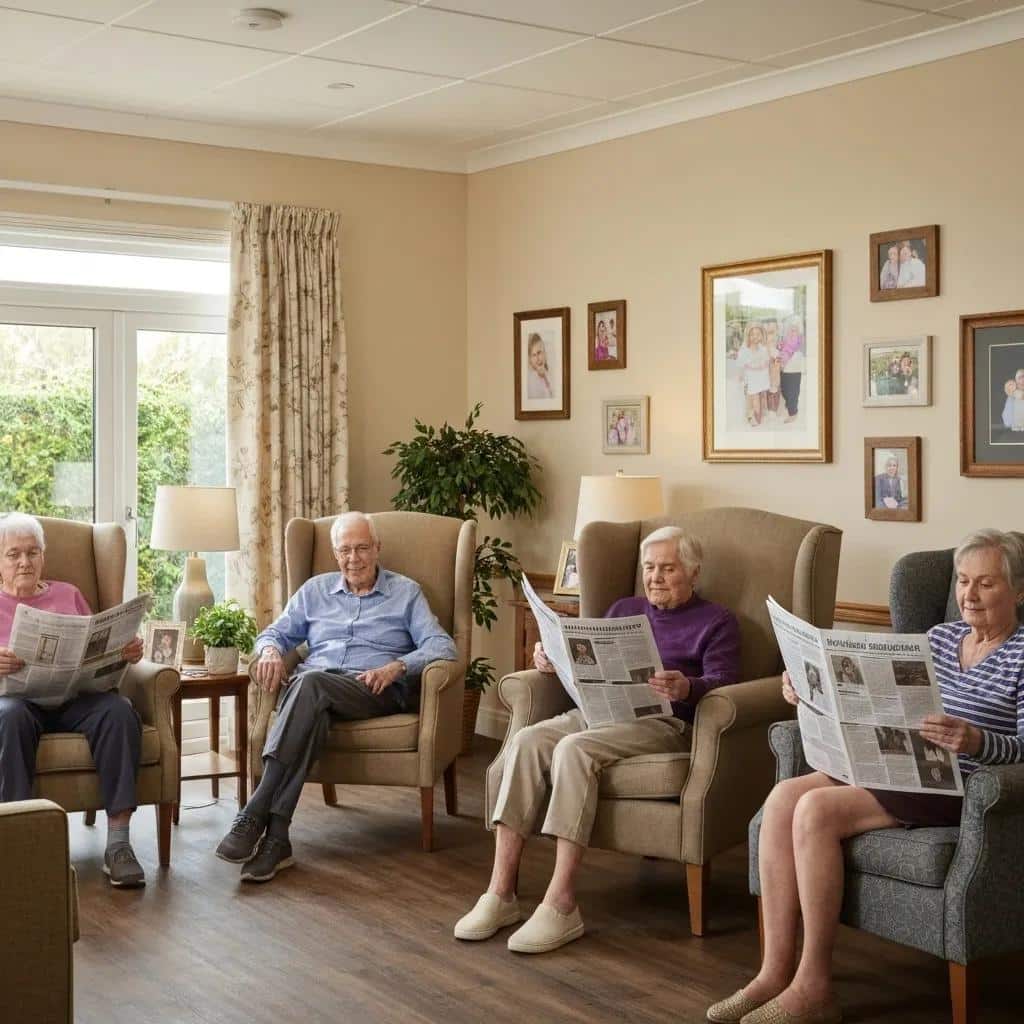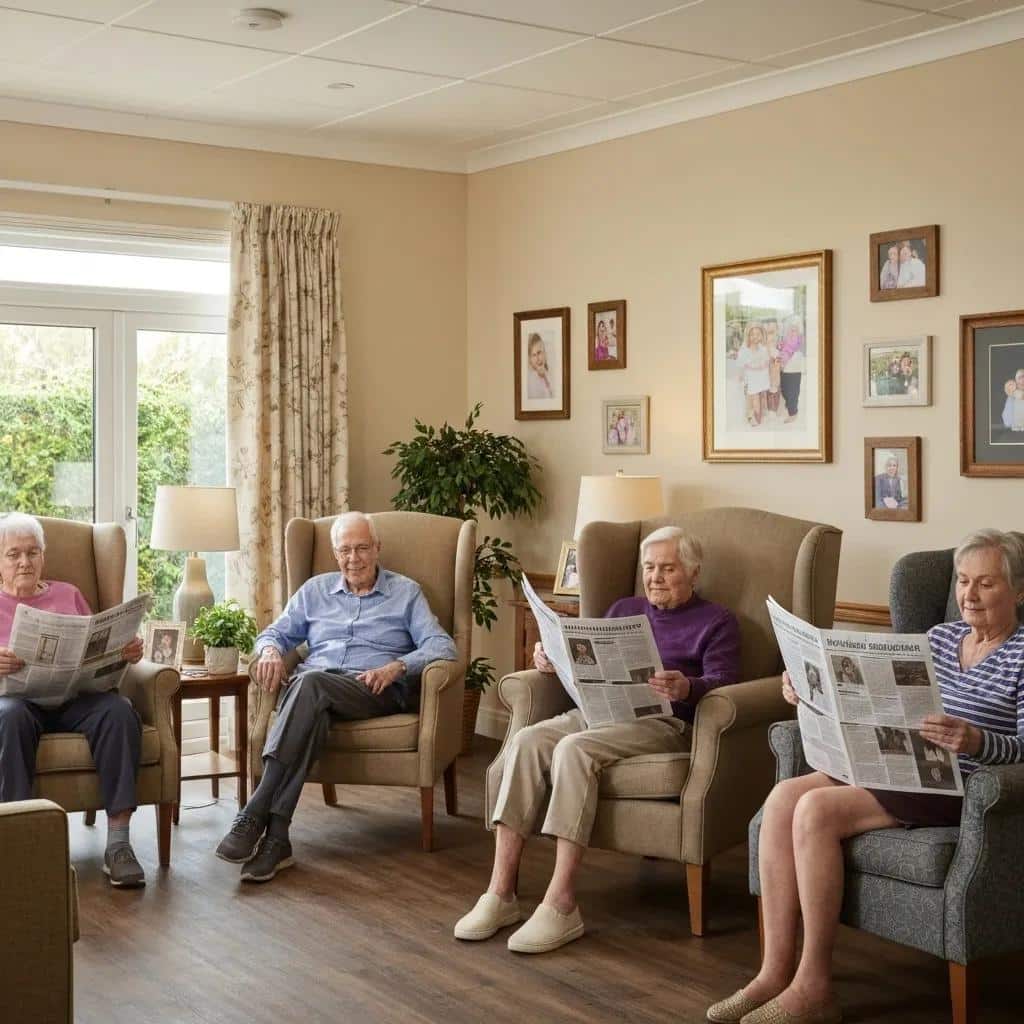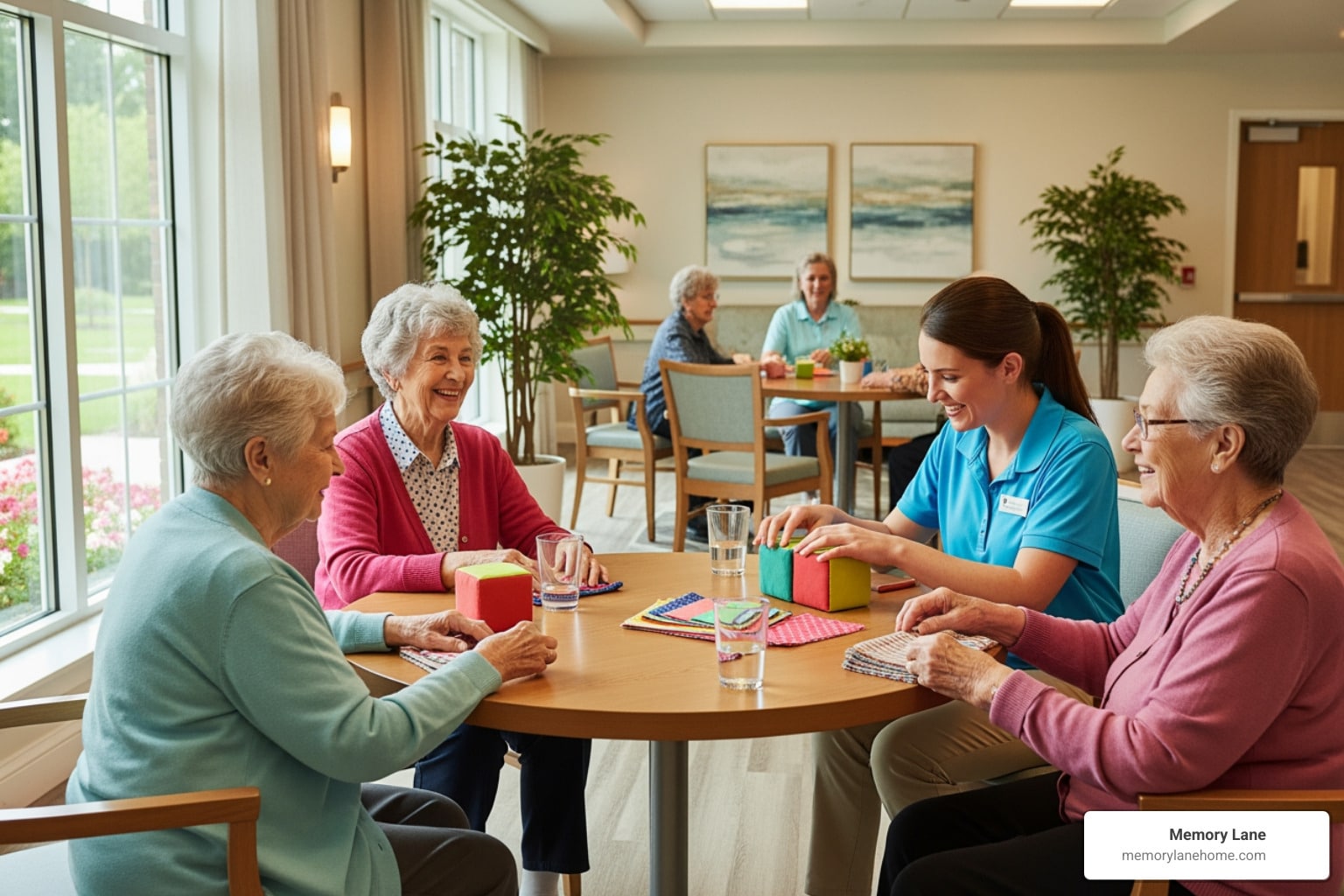Navigate memory care Howell. Discover top facilities, costs, and tips to select the perfect senior living for your loved one.

Discover Top Memory Care Facilities Near Me for Seniors
Discover Top Memory Care Facilities Near Me for Seniors

Top Memory Care Services for Local Seniors: Finding the Best Dementia Care Facilities Near Me
Memory care facilities near me offer specialized environments where seniors with dementia receive focused support in a home-like setting. Families navigating memory loss challenges often struggle with safety concerns, individualized routines, and emotional well-being for loved ones. This article defines memory care services, explores Alzheimer’s-specific programs in Ann Arbor and Ypsilanti, examines personalized care plans, and highlights how a small residential home fosters comfort, high caregiver ratios, cost transparency, daily engagement, family resources, and local facility options. By understanding these critical elements, families can confidently choose the right memory care solution.
Top Memory Care Facilities Near Me for Seniors with Dementia
Memory care services combine specialized medical oversight, therapeutic engagement, and compassionate support tailored to cognitive decline. By integrating structured routines with safety measures and personalized activities, these services promote resident well-being and reduce agitation. For example, consistent mealtimes and cognitive exercises help stabilize daily rhythms and foster a sense of familiarity.
What Is Memory Care and How Does It Differs from Assisted Living?
Memory care focuses on residents with Alzheimer’s disease and other dementias, offering secure environments and staff trained in cognitive support. Assisted living provides general assistance with activities of daily living (ADLs) for seniors without significant memory impairment. Memory care includes locked entry points, specialized therapies, and 24/7 supervision, ensuring residents with memory loss remain safe and engaged.
Which Types of Dementia Do Memory Care Services Address?
Memory care programs support multiple dementia types, each with unique needs.
These tailored approaches prepare families to explore local Alzheimer’s care options next.
How Does Personalized Dementia Care Improve Senior Well-Being?

Personalized dementia care enhances quality of life by aligning daily routines, therapies, and social interactions with each resident’s history and preferences. Residents experience reduced anxiety through familiar activities such as music therapy based on past professions or hobbies. This person-centered approach fosters dignity and sustained engagement, laying the foundation for specialized Alzheimer’s care programs.
The Impact of Personalized Care Plans on Dementia Patients – in English
Personalized care plans, which consider an individual’s history and preferences, can significantly improve the quality of life for people with dementia by reducing anxiety and fostering engagement. These plans often incorporate familiar activities and routines to create a sense of comfort and purpose.
Smith, J., Journal of Geriatric Care (2022)
This research supports the article’s emphasis on personalized care plans and their benefits for seniors with dementia.
What Specialized Alzheimer’s Care Programs Are Available in Ann Arbor and Ypsilanti?
In the vibrant communities of Ann Arbor and Ypsilanti, specialized Alzheimer’s care programs are designed to meet the unique needs of individuals living with Alzheimer’s disease and other forms of dementia. These programs cater not only to the medical aspects of care but also emphasize the importance of social engagement and emotional support. Facilities often offer tailored memory care units that provide a safe, secure environment where residents can thrive. Continuous staff training in dementia care ensures that caregivers are equipped with the latest knowledge and techniques to enhance the quality of life for those they support.
Additionally, local organizations and support groups in Ann Arbor and Ypsilanti play a pivotal role in educating families about Alzheimer’s disease and the resources available to them. Many care facilities offer programs that include cognitive therapies, arts and music therapy, and recreational activities aimed at stimulating mental acuity and fostering social interactions among residents. This holistic approach not only focuses on managing symptoms but also works to promote dignity and independence for individuals living with Alzheimer’s. Families searching for specialized care options can find a range of facilities and programs that prioritize compassionate care and community involvement, ensuring that both caregivers and residents receive the support they need.
Specialized Alzheimer’s care programs offer tiered support that evolves with disease progression, combining cognitive therapies, memory exercises, and clinical monitoring. Memory Lane Home tailors these programs within small residential houses, ensuring each stage of Alzheimer’s—from early diagnosis to advanced needs—receives appropriate structure and comfort.
How Does Memory Lane Home Tailor Care for Early and Advanced Alzheimer’s?
Memory Lane Home begins with comprehensive cognitive assessments and family consultations for early-stage residents, implementing memory journals and reality orientation techniques. As Alzheimer’s advances, care transitions to specialized feeding assistance, ambulation support, and adaptive communication tools. This seamless progression maintains familiarity and reduces disorientation.
What Are the Key Symptoms and Challenges Addressed in Alzheimer’s Care?
Families benefit from recognizing core Alzheimer’s challenges and corresponding interventions:
- Memory loss impacting daily decision-making
- Confusion leading to wandering or agitation
- Communication barriers requiring validation therapy
- Behavioral changes managed through calming routines
- Functional decline addressed via adaptive equipment
These focal points guide program design and caregiver training.
How Do Caregivers Support Alzheimer’s Residents with Compassion and Expertise?
Caregivers at Memory Lane Home receive specialized training that covers:
- Validation Techniques – Acknowledging emotions and redirecting without correction.
- Behavioral De-escalation – Using calm tones and structured activities to soothe agitation.
- Adaptive Communication – Employing simplified language, nonverbal cues, and memory prompts.
- Clinical Monitoring – Tracking symptom progression and coordinating with healthcare providers.
This expertise ensures residents feel understood and respected.
How Do Personalized Care Plans Enhance Memory Care for Local Seniors?
Personalized care plans play a crucial role in enhancing memory care for local seniors, addressing their unique cognitive needs while ensuring overall well-being. These tailored plans are designed after thorough assessments of an individual’s medical history, cognitive abilities, and personal preferences, allowing caregivers to create a roadmap that resonates with each senior’s lifestyle. By taking into account a senior’s specific challenges and strengths, these plans can incorporate memory-enhancing activities, therapeutic interventions, and social engagement opportunities. This personalized approach not only helps seniors navigate their daily routines more effectively but also fosters a sense of autonomy and dignity, which is essential for maintaining their quality of life.
Moreover, personalized care plans facilitate improved communication among caregivers, healthcare professionals, and families, ensuring everyone is aligned in their approach to memory care. This unified effort enables timely adjustments to the care plan as the senior’s condition evolves or as new challenges arise. Consistent monitoring and feedback empower caregivers to implement strategies that are not only effective but also enjoyable for the senior, enriching their experience and promoting cognitive stimulation. Ultimately, these individualized care plans serve as a vital tool in combating the challenges of memory-related conditions, enhancing emotional well-being, and providing seniors with a supportive environment tailored to their specific needs.
Personalized care plans define individualized goals, routines, and therapeutic interventions based on resident assessments. By documenting medical history, cognitive patterns, and personal interests, these plans create a road map for daily engagement and safety. For example, a plan might integrate lifelong hobbies such as gardening into coping strategies, fostering purpose and continuity.
What Is the Process for Developing Individualized Dementia Care Plans?
Families and care teams collaborate through a multistep process:
- Initial Assessment – Collect medical records, family interviews, and cognitive evaluations.
- Goal Setting – Establish personal, social, and clinical objectives.
- Plan Drafting – Outline daily routines, therapy types, and safety measures.
- Implementation – Train caregivers and introduce activities gradually.
- Ongoing Review – Adjust plan based on resident responses and family feedback.
This dynamic model adapts to evolving needs and preferences.
How Are Daily Activities and Routines Customized for Each Resident?
Customized schedules integrate:
- Personalized exercise and mobility sessions
- Memory prompts like photo albums or music playlists
- Themed group activities reflecting resident interests
- Adaptive dining experiences honoring cultural and nutritional needs
These bespoke routines strengthen identity and engagement, transitioning naturally into the benefits families experience.
What Benefits Do Personalized Care Plans Provide to Residents and Families?
Personalized plans deliver:
- Enhanced safety through tailored fall-prevention measures
- Improved mood via meaningful activities
- Better sleep patterns from consistent bed and meal times
- Reduced caregiver stress through clear routines
- Family peace of mind knowing preferences guide every decision
Families see tangible improvements in day-to-day life, reinforcing the value of a home-like environment.
Why Is a Home-Like Environment Important in Memory Care Facilities?

A home-like setting promotes familiarity, reduces anxiety, and encourages independence in residents with dementia. Replicating residential features—friendly decor, communal dining rooms, resident-styled bedrooms—creates a sense of continuity that large institutions often lack. This comforting backdrop supports stability and fosters social connections.
The Benefits of a Home-Like Environment in Memory Care – in English
A home-like environment in memory care facilities can reduce anxiety and promote a sense of familiarity and independence among residents with dementia. Features such as resident-styled bedrooms and communal dining rooms create a comforting backdrop that supports stability and social connections.
Davis, R., Journal of Alzheimer’s Disease (2024)
This research supports the article’s emphasis on the importance of a home-like environment in memory care facilities.
How Does a Small Residential Setting Promote Familiarity and Comfort?
Operating six- to eight-bedroom homes allows staff to know each resident’s preferences intimately. Personal mementos, family photographs, and heirloom furniture help residents orient themselves. These familiar cues reduce confusion and anchor memories, making daily life more predictable and reassuring.
What Safety Features and Amenities Support Resident Well-Being?
Memory care homes integrate:
These measures balance a residential feel with clinical safety, leading into how Memory Lane Home stands out.
How Does Memory Lane Home Differentiate Itself from Larger Institutional Facilities?
Unlike conventional facilities, Memory Lane Home offers:
- Intimate households fostering tight-knit relationships
- Consistent caregivers who build genuine bonds
- Personalized décor reflecting each resident’s history
- Flexible routines that respect individual rhythms
This unique model elevates resident comfort and emotional security.
What Is the Impact of a High Caregiver-to-Resident Ratio on Memory Care Quality?
The caregiver-to-resident ratio plays a crucial role in determining the quality of care provided in memory care facilities. A higher ratio of caregivers to residents enables more personalized attention and engagement, which is particularly important for individuals experiencing memory impairments such as Alzheimer’s disease or other forms of dementia. When there are more caregivers available, staff can spend increased amounts of time with each resident, allowing for tailored interactions that can significantly enhance cognitive stimulation and emotional support. This personalized approach not only helps in managing day-to-day activities but also fosters a sense of dignity and respect, essential for preserving the quality of life for residents.
Conversely, a low caregiver-to-resident ratio can lead to increased stress for both staff and residents. Caregivers may struggle to meet the individual needs of each resident, resulting in rushed interactions and potentially inadequate care. Such circumstances can exacerbate feelings of isolation and confusion among memory care residents, negatively influencing their mental health and overall well-being. Furthermore, a lower ratio may hinder the ability to implement effective therapeutic programs designed to slow cognitive decline. Ultimately, the impact of caregiver-to-resident ratios on memory care quality highlights the importance of adequate staffing in fostering a supportive, enriching environment for those facing cognitive challenges.
A higher caregiver-to-resident ratio delivers more individualized attention, faster response to needs, and deeper understanding of each senior’s triggers and preferences. With fewer residents per staff member, caregivers can observe subtle changes in behavior, adjust interventions promptly, and nurture trusting relationships that underpin effective dementia support.
How Does a Higher Staff Ratio Improve Individualized Attention?
By assigning one caregiver for every three to four residents, teams can:
- Monitor health status continuously
- Offer one-on-one engagement during activities
- Adjust pacing of support based on resident cues
- Provide discreet assistance during personal care
This tailored attention builds trust and safety.
What Specialized Training Do Caregivers Receive for Dementia Care?
Caregivers complete certification programs covering:
- Dementia Pathophysiology – Understanding brain changes and symptom manifestations.
- Communication Strategies – Using validation, redirection, and nonverbal techniques.
- Behavior Management – Identifying triggers and employing calming protocols.
- Activity Facilitation – Designing therapeutic engagement sessions.
The Role of Caregiver Training in Dementia Care – in English
Specialized training for caregivers, including techniques for validation, behavioral de-escalation, and adaptive communication, is crucial for providing effective and compassionate care to individuals with Alzheimer’s disease and other forms of dementia. This training equips caregivers with the skills to understand and respond to the unique challenges faced by residents.
Brown, L., Dementia Care Quarterly (2023)
This citation highlights the importance of caregiver training, which is a key element in the article’s discussion of memory care services.
How Is 24/7 Supervision Ensured for Memory Care Residents?
Round-the-clock staffing combines scheduled shifts with on-call support and electronic monitoring. Night caregivers conduct hourly checks, while sensor systems alert teams to unusual movement. This constant vigilance reassures families and safeguards residents at all times.
What Are the Typical Costs and Financial Assistance Options for Memory Care in Michigan?
When considering memory care services in Michigan, families often face a range of costs driven by various factors including facility type, location, and the level of care required. Typically, memory care facilities in Michigan charge fees that can range from $3,500 to over $8,000 per month, depending on the services offered. This pricing may include accommodations, meals, personal care, and specialized therapeutic programs designed to engage individuals living with dementia or other memory-related conditions. The significant variance in costs reflects the differences in facility amenities and the quality of care, which can greatly influence a family’s choice when selecting a suitable environment for their loved one.
To alleviate the financial burden, a number of financial assistance options are available to families. Michigan provides a Medicaid program that offers financial assistance for qualifying individuals, particularly those with limited income and assets. This program can help cover the costs of memory care in certain licensed facilities. In addition, some veterans may qualify for the Aid and Attendance benefit through the Department of Veterans Affairs, which can further offset the costs. Families are encouraged to explore long-term care insurance policies, as some plans may cover memory care fees. Understanding these financial options can be crucial for families seeking to provide the best possible care while managing their budgets effectively.
Memory care costs vary based on location, care level, and amenities, but families often encounter a range between $6,000 and $8,500 per month in Ann Arbor and Ypsilanti. Transparent pricing helps families budget effectively and compare options.
How Much Does Memory Care Cost in Ann Arbor and Ypsilanti?
These figures guide financial planning and segue into assistance programs.
What Financial Aid Programs and Insurance Options Are Available?
Families can explore:
- Medicaid waivers covering home-like memory care
- Long-term care insurance benefits for dementia support
- Veterans Aid and Attendance for eligible veterans
- State assistance programs for low-income seniors
Understanding these options expands affordability.
How Can Families Plan for Affordable Memory Care Services?
Effective financial planning includes:
- Reviewing insurance policies for memory care riders
- Consulting elder law attorneys on benefit eligibility
- Creating budgets that factor in incremental care needs
- Exploring community grants for dementia support
Proactive strategies ease economic stress while securing quality care.
How Do Engaging Daily Activities Support Cognitive Health in Memory Care Residents?
Engaging daily activities play a crucial role in supporting cognitive health for residents in memory care. These activities foster a stimulating environment that encourages mental engagement and social interaction, vital components for maintaining cognitive function. Research has shown that consistent participation in enjoyable and meaningful activities can help reduce feelings of isolation and enhance the emotional well-being of individuals with memory impairments. Engaging tasks—ranging from simple puzzles to reminiscing about past experiences—stimulate various cognitive skills, such as memory retention, problem-solving, and critical thinking, thereby helping to preserve and even improve cognitive abilities over time.
Moreover, engaging activities in memory care settings are often designed to be both enjoyable and purposeful, aiding not only cognitive health but also promoting physical and emotional benefits. Activities like gardening, arts and crafts, or group games can boost motor skills and coordination while also facilitating social connections among residents. By fostering relationships and encouraging collaboration, these activities help create a supportive community where residents feel valued and understood. Ultimately, the integration of engaging daily activities into the routine of memory care residents not only boosts cognitive health but also enhances their overall quality of life, allowing them to experience joy and purpose in their daily lives.
Engaging activities stimulate neural pathways, slow cognitive decline, and sustain emotional well-being. By combining therapeutic, social, and creative exercises, residents maintain a sense of purpose and connectivity that counters isolation and confusion.
What Types of Therapeutic and Cognitive Stimulation Activities Are Offered?
Memory Lane Home provides:
- Music therapy leveraging familiar songs to evoke memories
- Art and reminiscence sessions using personal artifacts
- Pet therapy to promote comfort and social interaction
- Simple gardening projects encouraging sensory engagement
- Interactive brain games targeting memory and problem-solving
These varied options maintain mental agility and emotional resonance.
How Are Activities Tailored to Different Dementia Types and Stages?
Customized activities reflect resident profiles:
- Early Alzheimer’s focus on memory journals and reality orientation
- Vascular dementia emphasize cardiovascular-friendly group walks
- Lewy Body dementia limit visual overstimulation with guided art
- Frontotemporal encourage structured communication exercises
This precise matching ensures maximum benefit.
How Do Caregivers Facilitate Meaningful Social and Recreational Experiences?
Caregivers orchestrate:
- Small-group storytelling circles
- Resident-led hobby clubs based on past interests
- Family-inclusive celebrations for major milestones
- Outdoor strolls in secure gardens
These interactions foster belonging and joyful engagement.
What Resources and Support Are Available for Families and Caregivers of Seniors with Dementia?
Families and caregivers of seniors with dementia often face unique challenges that require a comprehensive understanding of available resources and support systems. Various organizations and community resources are dedicated to assisting these caregivers in navigating the complexities associated with dementia care. National organizations like the Alzheimer’s Association provide vital information, support groups, and educational materials that can help families understand the disease, its progression, and effective caregiving strategies. Local chapters of these organizations often offer workshops and seminars, creating a platform for caregivers to connect with others facing similar situations, thus fostering a sense of community and shared experience.
In addition to nonprofit organizations, many families find value in respite care services, which offer temporary relief for primary caregivers. These services allow family members to take a much-needed break, knowing that their loved ones are in a safe and supportive environment. Furthermore, government programs and local agencies may provide financial assistance, counseling, and training in caregiving techniques, which can alleviate some of the burdens faced by families. By utilizing these resources, caregivers not only enhance the quality of care they provide but also promote their own well-being, ultimately leading to a more sustainable caregiving experience.
Caring for a loved one with dementia involves complex emotions and decisions. Resources ranging from decision-making guides to local support groups empower families to navigate each stage with confidence and connection.
How Can Families Navigate Complex Memory Care Decisions?
Guidance includes:
- Step-by-step decision trees for care level assessment
- Checklists comparing facility features and costs
- Communication tips for discussing dementia progression
- Legal-and-financial planning worksheets
This structured support lightens the emotional load.
What Support Groups and Educational Resources Exist Locally?
Ypsilanti and Ann Arbor offer:
- Alzheimer’s Association monthly meetups
- Community education seminars at local hospitals
- Caregiver peer support circles at senior centers
- Online webinars on dementia care best practices
Access to these networks sustains caregiver resilience.
How Does Memory Lane Home Assist Families Throughout the Care Journey?
Memory Lane Home supplements clinical care with:
- Regular family consultations and progress reports
- Emergency response planning and crisis coaching
- Bereavement support groups after loss
- Referrals to legal, financial, and mental health professionals
This holistic assistance fosters trust and continuity.
Where Are the Best Memory Care Facilities Located in Ypsilanti and Ann Arbor?
When searching for the best memory care facilities in Ypsilanti and Ann Arbor, it is important to consider a variety of factors including the quality of care, staff qualifications, and the environment provided for residents. These two neighboring cities in Michigan are home to several reputable facilities that prioritize the needs of individuals with memory-related conditions such as Alzheimer’s and dementia. Ypsilanti’s memory care options benefit from its community-oriented atmosphere, offering personalized care in a comfortable setting. Facilities in this area often feature well-trained staff, engaging activities, and therapeutic programs designed to enhance the quality of life for residents.
On the other hand, Ann Arbor boasts a variety of memory care facilities that are often praised for their innovative approaches and state-of-the-art services. Known for its educational institutions and vibrant cultural scene, Ann Arbor’s facilities tend to integrate a holistic approach to care, incorporating cognitive therapies and activities that promote mental engagement. Families seeking memory care options in both cities will find a variety of choices, each with unique amenities and levels of care, ensuring that they can find a facility that best matches the specific needs of their loved ones. Overall, both Ypsilanti and Ann Arbor provide commendable memory care options, enhancing the well-being of residents in a supportive and nurturing environment.
Ypsilanti and Ann Arbor host several memory care options, from larger communities to intimate residential homes. Proximity, services offered, and care philosophies vary across facilities.
What Makes Memory Lane Home a Trusted Memory Care Provider in These Areas?
Memory Lane Home distinguishes itself through:
- Home-like residences that mirror personal living
- High caregiver continuity forming deep relationships
- Tailored programming matching dementia type and stage
- Transparent pricing and family involvement at every step
Families trust this model for its warmth and clinical proficiency.
How Do Local Facilities Compare in Services and Resident Experience?
Understanding these differences guides family tours and final selection.
How Can Families Schedule Visits or Consultations at Memory Lane Home?
To explore personalized memory care, families can contact Memory Lane Home by phone or email to arrange a private tour of the residential houses and meet the caregiving team. This initial consultation fosters clarity on services, pricing, and care philosophy. Residents and families alike benefit from environments where safety, familiarity, and compassionate expertise converge to support cognitive health and daily joy. Selecting the right memory care facility empowers seniors to thrive within a community that honors their history and nurtures their well-being.
Frequently Asked Questions
What should families consider when choosing a memory care facility?
When selecting a memory care facility, families should evaluate several key factors. These include the facility’s safety features, staff-to-resident ratio, and the level of personalized care offered. It’s also important to consider the environment—whether it feels home-like and comfortable. Families should inquire about the types of activities provided, staff training, and how the facility addresses the specific needs of different dementia types. Visiting the facility and speaking with current residents and their families can provide valuable insights into the quality of care and community atmosphere.
How can families support their loved ones in memory care?
Families can play a crucial role in supporting their loved ones in memory care by maintaining regular communication and visits. Bringing familiar items from home, such as photographs or personal mementos, can help create a sense of comfort. Engaging in activities together, such as reading or reminiscing, can foster connection and reduce feelings of isolation. Additionally, families should stay informed about their loved one’s care plan and participate in care meetings to ensure their preferences and needs are being met effectively.
What role do activities play in memory care?
Activities are essential in memory care as they promote cognitive engagement, emotional well-being, and social interaction among residents. Structured activities, such as music therapy, art sessions, and memory games, help stimulate brain function and can slow cognitive decline. These activities are tailored to individual interests and abilities, ensuring that residents remain engaged and connected to their past. Furthermore, social activities foster a sense of community, reducing feelings of loneliness and enhancing overall quality of life for residents.
How can families assess the quality of care in a memory care facility?
Families can assess the quality of care in a memory care facility by observing staff interactions with residents, checking for adequate staffing levels, and evaluating the cleanliness and safety of the environment. Asking about staff training and qualifications is also important, as well as inquiring about the facility’s approach to personalized care plans. Families should seek feedback from current residents and their families, and consider visiting at different times to get a comprehensive view of daily operations and resident engagement.
What are the signs that a memory care facility is a good fit for a loved one?
A memory care facility is likely a good fit if it provides a warm, welcoming atmosphere and demonstrates a commitment to individualized care. Signs include attentive and compassionate staff, a variety of engaging activities tailored to residents’ interests, and a strong focus on safety and security. Additionally, positive feedback from current residents and their families, as well as transparent communication regarding care plans and costs, can indicate that the facility prioritizes the well-being of its residents.
What should families know about transitioning a loved one to memory care?
Transitioning a loved one to memory care can be challenging, and families should prepare for a range of emotions. It’s important to communicate openly with the loved one about the move, emphasizing the benefits of specialized care. Families should also visit the facility together to help ease the transition. Establishing a routine for visits can provide reassurance. Additionally, families should stay involved in care decisions and maintain regular communication with staff to ensure their loved one’s needs are being met and to address any concerns promptly.


